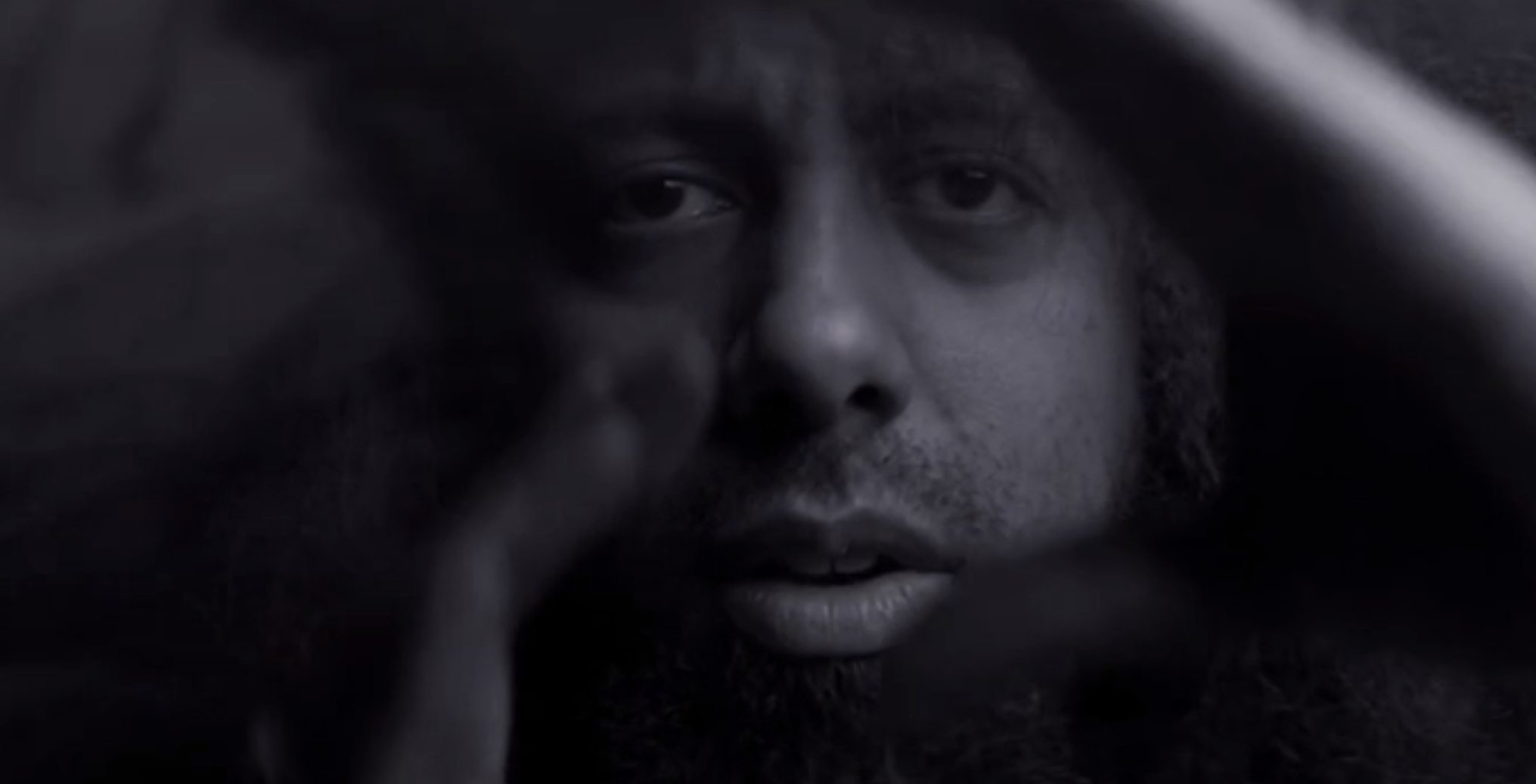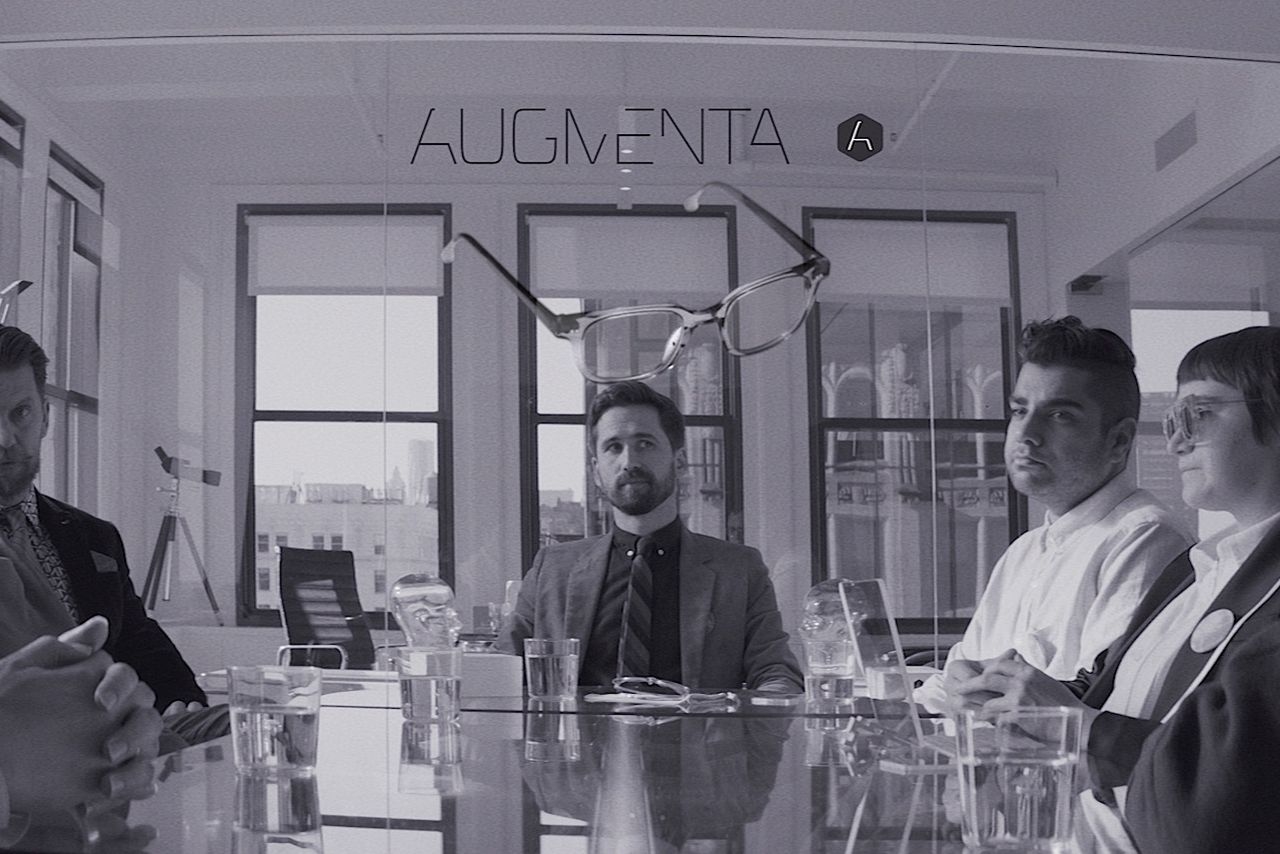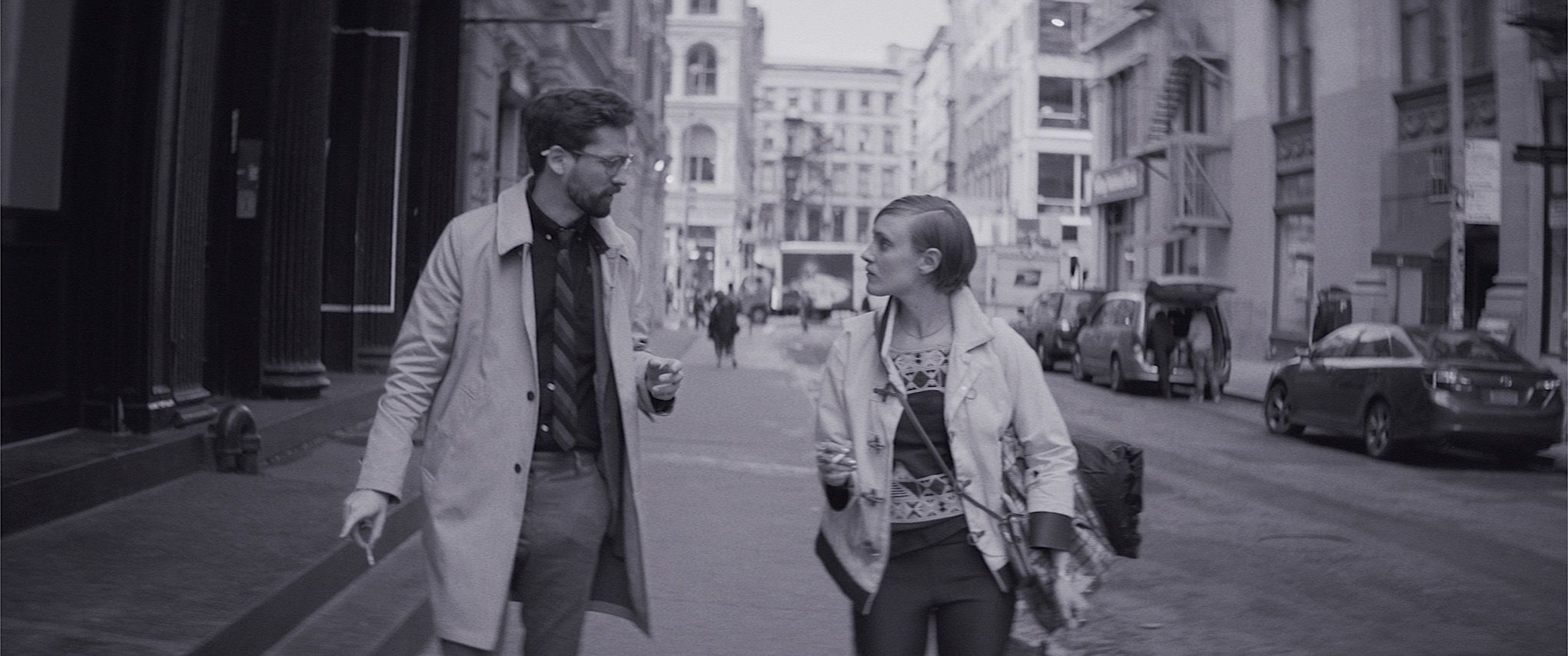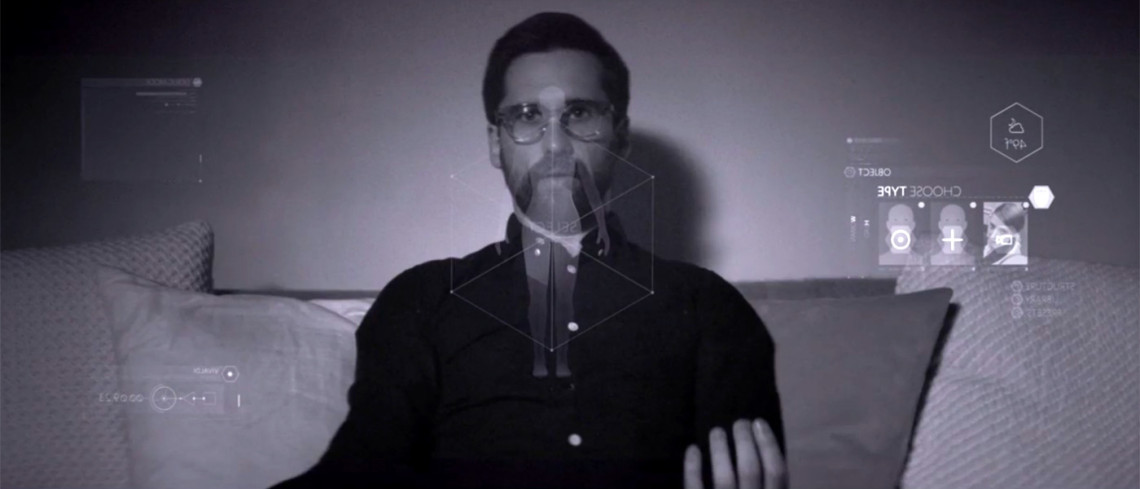The pervasiveness of technology is at the forefront of the new film Creative Control, whose star, co-writer and director Benjamin Dickinson utilizes black-and-white cinematography and dry humor to satirize our overreliance on wearable tech and how that blinds us from face-to-face relationships and priorities. At the Sundance Film Festival in Park City, Utah this past January, Movie Mezzanine’s Sam Fragoso sat down with Dickinson to talk about morality, meditation, and more.
Sam Fragoso: Run me through life leading up to Creative Control.
Benjamin Dickinson: I was born in Santa Monica, California. Very beautiful. I lived in the Los Angeles area till I was 5. Then we moved to Illinois, a suburb of Chicago, called Wheaton. A John Hughes town. Wheaton Warrenville South High School.
What happened in high school?
I think in eighth grade, I started playing around with my dad’s camcorder and making little movies. And then, in high school, I did some theater, but I started making short films. I started a film festival at my school.
How’d you do that?
I mean, just me and a couple of teachers. You know, we had an auditorium and a big projector. I made a film every year, sophomore, junior, senior year. And there was about four or five other guys and girls making movies
In high school, were you the filmmaker?
There was a couple of us. Some of my friends were more into sketch comedy. It was everybody who was weirdoes, and there was a few of us.
You were a weirdo?
Well, maybe from Wheaton, Illinois. I’m a Midwestern person. My dad’s from Milwaukee. I’ve been in New York for 16 years. My high school football team won the state championship three out of the four years I was in high school. I was the captain of the cross-country team. I wasn’t exactly an athlete. It was interesting—my high school was so much like The Breakfast Club, in terms of the archetypal roles, it was that.
What was your role?
I guess I was most like Anthony Michael Hall’s character. If I had to choose one. And some of my friends were Judd Nelson. Those were the worlds that I moved in. And I had friends that were drug dealers, and went to jail. And I had friends who went to Princeton. It’s kind of a mashup.
Did any of them end up making movies?
I’m kind of the only one. Then I went to NYU Film School. I was 17 when I went to New York, which I was not ready for. Unless you grow up there. I had visited once, to visit NYU after I got accepted. One time. I was overwhelmed, you know? And I thought I couldn’t cut it. It was more just the intensity of the city. I felt like a provincial Midwesterner. I felt intimidated by East Coast people in general.
So how’d you make it work?
[pauses] Well, I guess I met a couple of people at NYU with similar interests. I remember one of the first friends I made was this guy Dave Buckner, who I’m still friends with. And he and I bonded; we were both into meditating. I got into Zen meditation when I was 16, or maybe 15.
Are you still into it?
Yeah, I still do it. I recommend it. It kind of shifts everything. I go through phases. I’m kind of doing it every day right now because I need something to ground me in this craziness. I just met some good people, and I guess after a semester of film school, I felt I could hack it, that I belonged there. And then, by the time I was a sophomore, I could just tell that I was competing.
And you liked that.
I’ve always felt ambivalent about the idea of competition and art, because it actually seems antithetical to the process of creativity in some ways. And I think some of it is artificially magnified by the fact that we live in a capitalistic culture, so art is made specifically to be sold, especially films.
More than most art.
Because they’re so expensive, you know? I think that some people are really motivated by competition with other people. They see someone do good work and [think], “I’m going to do something even better.” That’s never been where I come from. I have insecurities like anybody else, and I compare myself [to others] like anybody else.
What are the insecurities?
It’s sort of a general feeling of, “Am I relevant on the planet? Do I belong here? Why am I here?”
You don’t feel like you belong?
On Earth? I often feel like I don’t belong on Earth.
Why’s that?
I guess because a lot of times, the agreed-upon games and the agreed-upon morality, I don’t resonate with.
Like what?
I guess I kind of express myself [about that] in my movies.
When I ask you about insecurities, you pivot away from it…
Or into it. I’m trying to give it a context. Like, Creative Control, I think of it as a satire. You don’t have to watch it that way. The things that the characters are motivated by, specifically the character that I play, David—he wants to be successful and he wants to achieve his ego goals, and he wants what he can’t have. And he can’t figure out how to connect with his girlfriend, the relationship in his life that should be the most meaningful.
And you’ve had these issues?
I exaggerated it for the purpose of drama. But yeah, I’ve been through that stuff. It’s difficult to connect with people; it requires a lot of patience and a lot of vulnerability.
You think that’s universally true, or just for you?
I mean, I haven’t lived all over the world. I observe it being true in my generation, in my little slot of the universe.
What generation is that?
I think we’re Millennials? I’m 34, I was born in 1981. People that are my age, living in big cities, working in creative fields, they call it the creative class. I think these issues are common, from what I’ve observed, in that particular slice of reality. But, from having screened Creative Control at regional festivals, I’m surprised how much people who aren’t from that world are connecting with it. I think some of the anxieties that all of us have about technology, which I think tap into our basic animal anxiety and magnify it—I think that is universal, at least in the developed world. If you’re struggling to eat, that’s a little bit more basic.

I assume you’re not worrying about food.
I’m doing better these days. I mean, my twenties were a grind. Just trying to pay rent in New York City right out of school is hard.
When did the tide turn?
I mean, it’s basically been hand-to-mouth. In my twenties, I started doing music videos. That didn’t pay the bills that much.
I thought that’s the reason people do them.
No, you do music videos to kind of get your name out there. I got by doing it. When I first started out, I was PA-ing three days a week, and then directing and just doing whatever. Music videos led to commercials, which I never really enjoyed, but it was a way to live in New York. And it took me longer to make my first film than I thought it would. I was 30, I think, when I made First Winter.
What prevented you from doing so earlier?
Just life. I had some really tough family stuff happen. I was not emotionally ready for it. I was just working to live a lot. I got distracted.
Do you feel you’re emotionally ready now?
I don’t feel comfortable ever. I don’t know if I’ve ever felt comfortable.
Enough to make a movie, though.
I have confidence that it’s completely related to having done it for a while. It’s earned confidence. I still have the same anxieties I had when I was 16.
What are you not comfortable with?
I have this constant anxiety that I’m doing something wrong. I ascribe it to just a Puritanical, Midwestern morality that was programmed into me to a certain degree. I was raised born-again Christian. And I grew up in a very evangelical Christian town. So there’s a lot of anxiety about “Am I a good person? Am I doing this right?” And what’s so awful about that, and I think what’s awful about so-called “morality” in general, is that it puts human experience in a tiny little box. It abstracts human experience in a way where you’re looking at your life through a lens of a preconceived notion about what life is supposed to be like. But you can’t see life, because you’re always interpreting through this lens. As I’ve gotten older, I’ve shed these programs that aren’t mine that were given to me, to a certain degree, but there’s vestiges of that programming that are programmed so deeply. And if you look at the science that’s coming out now about genetics, they’re saying that trauma can be stored in our genes from previous generations. I don’t know, it sounds like a metaphor. Whether it’s karma or my ancestry, who knows.

But are you doing something wrong? Are you an asshole?
I think my idea about what an asshole is has changed. I used to think that being obsequious and adaptive to other people meant being a nice person. And making people feel comfortable and not upsetting anybody and making everybody like you was the same as being a nice person. I don’t believe that anymore. I actually don’t think that’s being a nice person, because it’s not being honest. And it doesn’t nurture your own needs. And you can actually find yourself in a relationship where the other person doesn’t know you, and you don’t know the other person. Because you’re proceeding from a point of trying to get them to like you, rather than being honest about how you really feel.
Is that what happened to you?
Yeah, sure, through the process of life, I learned very slowly how to be more honest with myself, and therefore, how to be more honest with other people. And to judge myself less, and to be more honest about what the experience about being human is. And that means that sometimes it’s ugly, sometimes I’m saying or I’m expressing things that I’m afraid people are going to judge me for, or that I’m judging myself for. Things that are painful or ugly or messy. And I think that is being a good person, being honest is being a good person. Because then somebody can actually respond to you. I guess from a certain point of view, this is what mid-century existentialists are advocating for, like Camus. But I also think it’s what Buddhism is advocating for. And in some ways, what Jesus’s teachings are advocating for, if you decode them. There’s this kind of crusty morality that really keeps people from being in their life. Being in the immediacy of their experience, being in their pain and sadness. Because if you experience pain and sadness, and you fail, then you have this bigger range of emotions. You can feel real joy and real happiness. But if you’re living in a very narrow box of what morality is supposed to be, everything is kind of depressing.
But aren’t you putting yourself in that box?
Exactly, but first I had to realize that I was doing that, because it was unconscious. Once you realize it, then you have to start dismantling it, and the behavior is so encoded that it creeps in everywhere. That’s where meditation comes in, that’s where the practice of presence comes in. You start to recognize how it goes into your consciousness, these behaviors. And then you can start to undo them. Are we going to talk about the movie, or is this just going to be insight into me? I don’t mind, by the way. I’m tired of talking about the movie.
You answered your own question.
(laughs) OK, great!

















